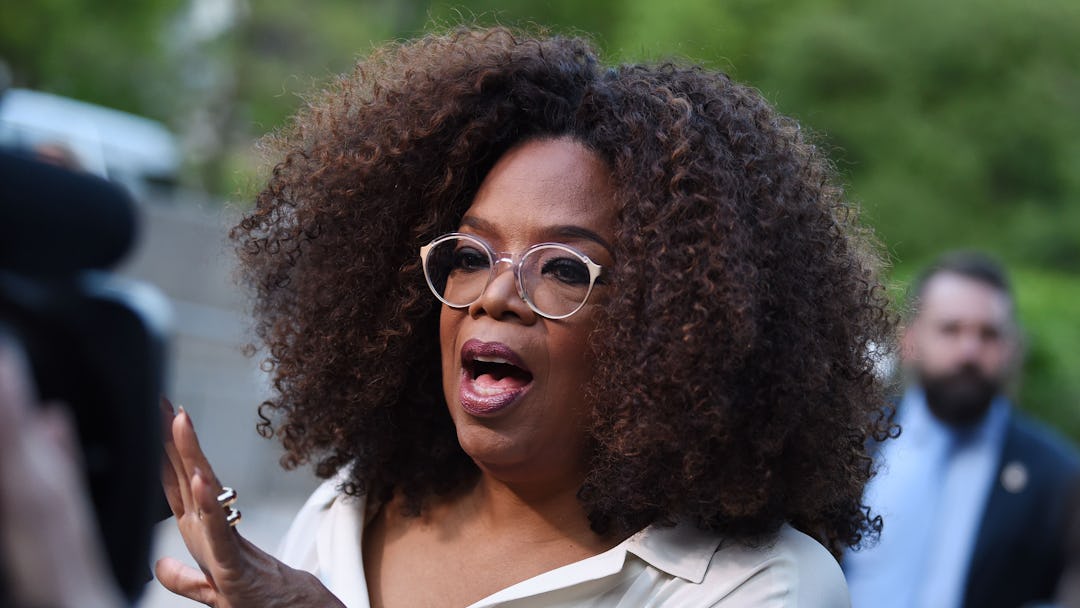I know, I know — we’re less than twenty-four hours out from a new Beyoncé album. Everything and everyone else is irrelevant for at least a week. But! Oprah Winfrey said some pretty cool stuff in her Hollywood Reporter cover story today, and it shouldn’t be ignored because the piece had the bad luck to drop right after Queen B pulled the Stunt of the Century. (Not that I think Oprah’s particularly stressed about Beyoncé stealing the spotlight. I imagine the two are probably congratulating each other over caviar at Illuminati headquarters right about now.)
Anyway, the THR profile is largely routine stuff, checking in on “the most famous woman in the world” as she heads into awards season with a buzzed-about performance in The Butler under her belt. Golden Globes snub aside, she’s also the recipient of THR‘s Sherry Lansing Leadership Award, landing her on the front page of its Women in Entertainment issue. Not that anyone needs a reason for commemorating Oprah at this point, but profile writer Lacey Rose gives a few: she’s managed to pull a 180 with her OWN network; her role in The Butler was way more than a celebrity cameo; she’s the kind of lady who treats her guests to a lunch that puts Martha Stewart to shame. I mean, lobster Cobb salad? Jesus.
Oprah doesn’t make any ground-breaking revelations in her interview with Rose. She denies that she suffered a “nervous breakdown” in 2012, pays some lip service to the idea of scaling back, and tells us about her email correspondence with the students at South Africa’s Oprah Winfrey Leadership Academy for Girls. It’s this last endearing detail that brings the conversation around to the inevitable. Oprah’s clearly invested in these kids’ future, so why doesn’t she have any of her own? Here’s where things get interesting.
“If I had kids, my kids would hate me,” Winfrey replies. “They would have ended up on the equivalent of the Oprah show talking about me; because something [in my life] would have had to suffer and it would’ve probably been them.” At 59, Winfrey is past the point of both endless speculation over whether she’ll ever be a mom and pretending she has any regrets over missing out on motherhood. Having a family was never a part of her considerable ambition; while Gayle was naming her kids in Home Ec, Winfrey was daydreaming “about how I could be Martin Luther King.”
While the dichotomy between aspiring mothers and aspiring civil rights leaders makes me slightly uncomfortable, Winfrey’s unapologetic childlessness still resonates. In a world full of Deborah Spars and Anne Marie Slaughters and other “wonder women” trying to “have it all,” Oprah is refreshingly honest about viewing her stratospheric success and fully committing to a family as mutually exclusive choices. And by publicly owning her decision to pursue the former over the latter, Winfrey communicates to her legions of fans that choosing a career over children is a viable solution to life/work angst. “She’s basically open about saying, ‘I wanted other things more,'” NPR’s Linda Holmes wrote on Twitter. “That’s very, very unusual to hear in public, and important.”
This isn’t the first time Oprah’s gone on the record about her decision not to become a mom, either. In a conversation with Barbara Walters printed in the May 2010 issue of O, Walters point-blank asked Winfrey if she regretted not having kids. Oprah’s answer? “No regrets whatsoever…I never had a desire. And I don’t think I could have this life and have children.” Being a parent requires “sacrifice and attention,” finite resources Winfrey would rather dedicate to her entertainment empire than kids. There’s no shame in making that evaluation, and Winfrey’s accordingly shameless.
Here she is again on the subject in 2011, this time on Walters’ ABC show: “I could not… first of all, could not have had this life and lived it with the level of intensity that is required to do this show the way its done. I’d be one of those people with their kids coming and saying, ‘Mom, you’ve neglected me.'” Winfrey couldn’t be Oprah if she wanted to be a mother, and she couldn’t be a mother if she wanted to be Oprah. So she made a choice to both go childless, and more importantly, speak publicly about her decision.
Candid about both the demands of her job and the demands of being a parent, Winfrey doesn’t just help destigmatize the idea of a woman who doesn’t have children out of choice rather than circumstance. (Though that’s a big, big deal in and of itself.) She also adds an important element to the conversation surrounding women in the higher echelons of the workplace, even those who do want a family. Under the current status quo, Winfrey tells us, it’s impossible to commit to both childcare and a role as a mogul or similarly high-powered positions we’d like to see more women occupying — senator and CEO both come to mind. So rather than shaming women who leave the workplace or forgo motherhood to accommodate that status quo, our efforts are better spent changing it.
That’s a tall order, obviously. But by being open about the choices she’s had to make, Oprah helps chip away at the impossible standard for women at the top of the ladder. And by refusing to express regret about her choice, she tells the women who look up to her they shouldn’t be afraid of doing the same.
